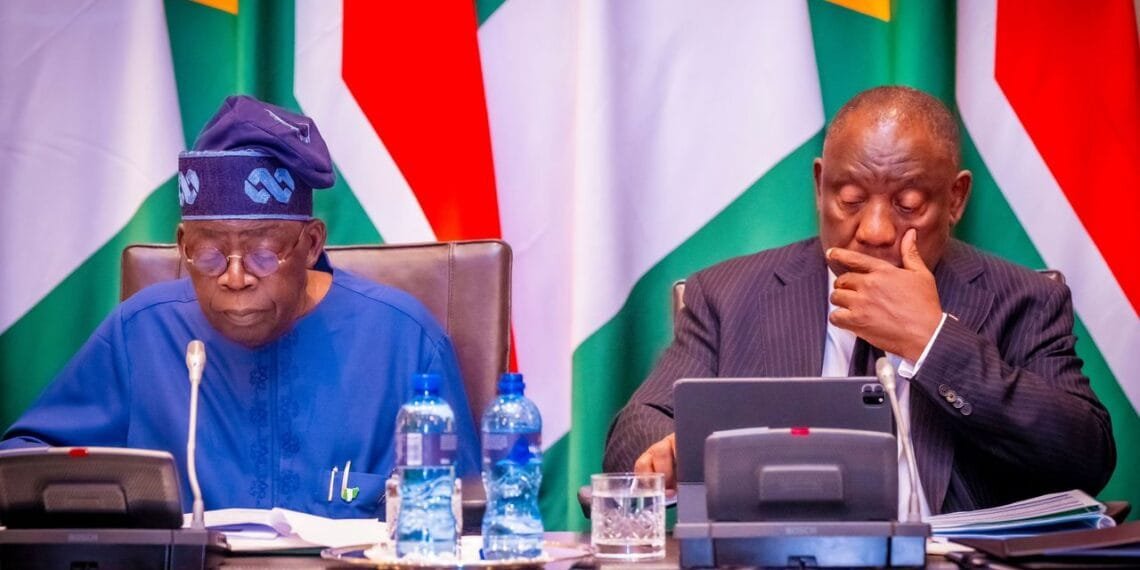South Africa has expressed its strong interest in Nigeria’s lithium reserves, viewing them as a critical component in the global shift toward green energy and the burgeoning electric vehicle (EV) industry. This announcement was made by President Cyril Ramaphosa during the Nigeria-South Africa Business Roundtable in Cape Town.
Speaking at the event, President Ramaphosa emphasized the importance of Nigeria’s lithium reserves in driving the development of EV batteries and advancing Africa’s role in the green energy revolution. He called for collaboration between Nigeria and South Africa, particularly in leveraging their combined resources to promote sustainable industrialization in the EV sector.
In a statement released by Bayo Onanuga, President Ramaphosa highlighted the immense potential for cooperation between the two nations. He urged the private sector and development finance institutions to play a pivotal role in building the infrastructure and manufacturing capabilities required to capitalize on the green energy transition.
“There is significant opportunity for collaboration on pharmaceuticals and clean energy manufacturing industries,” Ramaphosa said. He outlined South Africa’s progress in renewable energy, referencing the country’s Just Transition Framework and Investment Plan, which anticipate massive investments in the green economy in the coming years.
President Ramaphosa emphasized that the abundant natural resources in both Nigeria and South Africa should be strategically leveraged to promote green industrialization. He added that the importance of processing critical minerals locally, stating, “We should leverage each other’s capabilities in minerals processing. We must work together to ensure critical minerals are beneficiated at source.”
Calling on businesses to engage in these initiatives, Ramaphosa outlined a vision for a united African approach to clean energy, where collaboration between nations could transform the continent into a major player in the global green economy.
Read also: FAAC allocation crisis: Tinubu’s albatross in Rivers
Beyond economic collaboration, President Ramaphosa pledged South Africa’s unwavering support for Nigeria’s bid to join the G20, describing Nigeria as a “valued sister country.” He made this declaration during the official launch of South Africa’s G20 presidency in Cape Town, moments before welcoming President Bola Ahmed Tinubu to co-chair the 11th Bi-National Commission (BNC) between Nigeria and South Africa.
South Africa and the African Union are currently the only African representatives in the G20, but Ramaphosa argued for the inclusion of other key African nations, including Nigeria, to amplify the continent’s voice on the global stage.
Reflecting on South Africa’s role in advocating for the African Union’s admission into the G20 last year, President Ramaphosa stressed the need for continued efforts to ensure Africa’s perspectives are heard.
“For the longest time, Africa has been the neglected continent. Now, we have a voice, a presence, and we will be the biggest growth story in years to come,” he stated.
He highlighted Africa’s growing population and economic potential, asserting that the continent is poised to become a major force in global affairs. Ramaphosa called for the G20 to reflect this reality by admitting additional African countries, including Nigeria.
The discussions at the Bi-National Commission and the Nigeria-South Africa Business Roundtable mark a new chapter in the relationship between the two nations. With shared goals of green energy transition, industrialization, and greater representation on the global stage, Nigeria and South Africa are positioning themselves as leaders in shaping Africa’s future.
As Nigeria pursues its G20 ambitions and explores partnerships in renewable energy and EV technology, this renewed collaboration with South Africa signals a promising path forward. Both nations have an opportunity to redefine their roles in the global economy while championing Africa’s interests.
Time will tell whether these commitments translate into tangible progress, but the vision articulated by Presidents Ramaphosa and Tinubu sets the stage for a transformative partnership.






